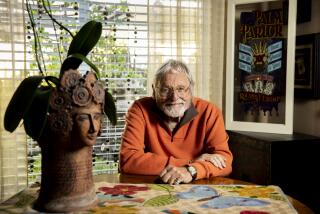Piling On Pop
- Share via
In “The Lost World: Jurassic Park,” Jeff Goldblum’s brainy Ian Malcolm is so in tune with the parental instincts of an extinct Tyrannosaurus rex that he intuitively predicts and explains her actions.
And so lacking in his own fatherly instincts that he forgets his daughter was cut from her gymnastics squad.
In “Liar Liar,” Jim Carrey is a selfish lawyer whose son, when asked by a teacher what Dad does for a living, answers: “He’s a liar.” When he’s a no-show for the kid’s birthday, his son wishes Dad would finally start telling the truth.
A chronically disheveled artist played by Jeff Daniels in “Fly Away Home” tries to bond with his 13-year-old geese-loving daughter, played by Anna Paquin. Not easy since the last time he saw her she was barely out of diapers.
Then there’s the upcoming film version of the classic “Leave It to Beaver” TV series. Ward Cleaver is a Wall Street hustler with a cellular phone stuck in his ear. Divorced from wife June, Ward disappoints sons Wally and Beaver by breaking promises to show up for soccer games and opting to spend Christmas with his girlfriend.
OK, the last one’s made up. Ward is still a decent parent. What’s shocking is that in Hollywood’s dysfunctional ‘90s, the filmmakers resisted the temptation to banish America’s model father to subplot hell by making him a flop of a dad whose kids complain that he’s “never there” for them.
It’s a rare home that isn’t fractured in the movies these days, especially in films marketed as “family” ones, with Dad almost always the problem. Granted, family life never was as serene as the near-perfect nuclear units Hollywood portrayed shortly after World War II, and especially isn’t now. But whether divorced or married, today’s multiplex Dad is usually a distant, dysfunctional caricature, one who has staked a presence in Hollywood’s “family” films in disproportionate numbers.
He’s a one-dimensional cliche thrown into the script as an afterthought a few minutes into the movie, serving little more than to provide a convenient diversion from the plot. It’s as if all that is required is the stroke of a key using a word-processing program for screenwriters. Alt-Shift-D gives you within the first 30 minutes an indifferent screw-up of a father who continually lets down his kids; Control-Shift-D and the situation is resolved in the final half-hour when Dad pulls it together to deal with a crisis.
Even when a film is based loosely on a real-life event, fatherly dysfunction manages to find its way into the film. “Fly Away Home” is a fictional story inspired by the adventures of a Canadian sculptor who, by all indications, didn’t have half of the chaotic family life his screen counterpart does. He was a guy who dreamed of flying alongside geese in an ultralight airplane, and his family cheered him on.
In the movie version, the character played by Daniels is an eccentric artist-inventor forced to take on his daughter when his ex-wife is killed in a New Zealand car crash. Daughter wakes up in a hospital after the accident to find Dad resting his head at the foot of her bed.
Fathers devoted to their children, such as Mel Gibson’s airline mogul facing his son’s kidnapping in “Ransom,” still get their characters nicked. In his case, there was that little corruption thing with the union. Robin Williams in “Mrs. Doubtfire” loved his children, but was immature.
But each ‘90s dysfunctional father eventually gets a chance to play a trump card, usually in the final half-hour of the film, that allows him to finally rise to the task by handling a crisis or event that endears him to his children.
One sure way Dad can redeem himself is to rescue cute animals. Saving geese from evil developers and sure death is the answer in “Fly Away Home.” In “The Amazing Panda Adventure,” it’s saving cute, cuddly bears from evil hunters. In “The Lost World,” the battle is with evil genetic engineers to save a T. rex and her baby.
When there are no cuddly animals to save, there’s always Christmas to be rescued, as Tim Allen did in “The Santa Clause.” Or bad fathers earn the respect of their kids by saving the family, as neglectful David Strathairn did in “The River Wild,” or Williams’ character proved in “Hook” when he finally put down his cellular phone.
What if the dysfunctional father is too far gone? No problem. It’s pretty easy to trade down to one of Mom’s boyfriends, or even a total stranger.
In “Kazaam,” the father-thief who walked out on his family 10 years ago is hauled off to jail at the end of the movie (although he hints that after serving some quality time behind bars, he’ll straighten up and finally spend some quality time with his son fishing). Enter Mom’s fireman boyfriend, whom the boy spends the entire movie disliking but now thinks is OK.
In “Angels in the Outfield,” the boy’s father is a deadbeat whose contribution to the movie is uttering the line of dialogue that inspires the central plot line: The boy will have a family again when the Angels win the pennant. He rides off on his motorcycle, replaced by Angels manager Danny Glover. The kid not only gets a father, but presumably box seats to all home games, at least until owner Walt Disney Co. fires Dad when the team doesn’t win.
None of this is the result of any great conspiracy by Hollywood to undermine fathers. More likely, it’s due in part to an annoying tendency to take the easy way out. A couple of years ago, Hollywood executives were all preaching that “family films” represented the Holy Grail of box office (until some PG movies belly-flopped).
So the solution to making more of them becomes a two-step process. Insert into the story line a father with a strained relationship with his kids. Then ratchet the tensions up a few notches by making sure he hasn’t seen them in a decade, or maybe is completely consumed by work, or is “never there” for them or barely recognizes his children. It’s a nice shortcut to turning a film into something that can be sold as a “family film” for kids who have graduated into PG movies from Disney animated features. It’s convenient that in the Menendez era, virtually every ill can be explained by a bad father, even patricide.
One can only imagine the potential for fathers. At a time when every old TV show eventually ends up as a movie script, how about one about the Jim Anderson clan?
Call it “Father Knew Best,” since Anderson no longer knows best. He “isn’t there” for Princess, Bud and Kitten, spends too much time on his cellular phone and forgets to call them on their birthdays from his Manhattan hotel room.
Then bring on some cute puppies they can all rescue.
More to Read
Only good movies
Get the Indie Focus newsletter, Mark Olsen's weekly guide to the world of cinema.
You may occasionally receive promotional content from the Los Angeles Times.









